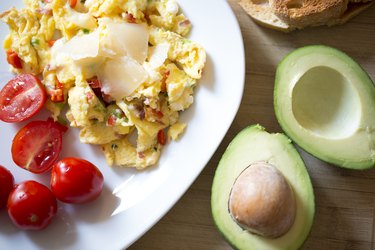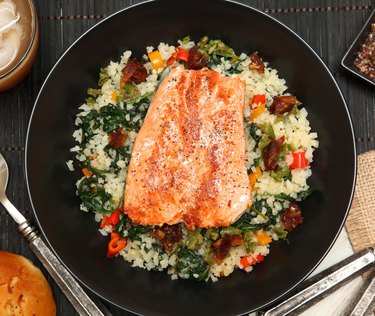
Many diet trends have you severely restrict sugar and carbohydrates (looking at you, keto) or ditch them altogether. But because many beneficial foods — like fruits, veggies and whole grains — contain these nutrients, is a strict no-carb, no-sugar diet the way to go for weight loss or health?
If you're thinking of starting a no-carb, no-sugar diet, read on for what you need to know.
Video of the Day
Video of the Day
What Is a No-Carb, No-Sugar Diet?
A no-carbs, no-sugar diet is much like what it sounds like: It's an eating plan that cuts carbohydrates and sugar from the menu. But it helps to know more about the nutrients before you decide to eliminate entire groups from your diet.
Carbohydrates are a macronutrient that provide your body with the energy it needs to function, according to the Cleveland Clinic. Sugars, starches and fiber are all types of carbs, and common sources of the nutrient include:
- Fruits and vegetables
- Legumes like beans, peas and lentils
- Whole grains like brown rice, oatmeal and whole-wheat bread
- Nuts and seeds
- Dairy products like milk
Fresh fruit and milk in particular are rich in naturally occurring sugars. And because these natural sugars are a beneficial part of balanced eating, diet plans that indicate "no sugar" typically mean cutting added sugar specifically.
Added sugar is sugar that has been added to a food during processing, per the Mayo Clinic. And while added sugar itself isn't necessarily bad for your health, the issue is that it's usually found in less-nutritious, processed foods like candy, baked goods or soda.
Common types of added sugar to check for on nutritional labels include:
- Cane juice and cane syrup
- Corn sweetener and high-fructose corn syrup
- Fruit juice concentrate and nectar
- Honey
- Malt
- Maple syrup
- Molasses
- Fructose, glucose, maltose and dextrose
Overall, it's difficult to completely cut carbs (including natural sugar) from your diet — in fact, it's generally not safe to go totally carb- and sugar-free, as you may not get the fuel or nutrients you need to function at your best, per the National Health Service (NHS).
How Much of These Nutrients Should You Eat A Day?
According to the 2020-2025 Dietary Guidelines for Americans, adults should aim to have carbs comprise 45 to 55 percent of their daily calorie intake. For someone who follows a 2,000-calorie diet, that means about 1,000 of your daily calories will come from carbs.
Adults should also aim for added sugar to make up less than 10 percent of their daily calorie intake. If you follow a 2,000-calorie diet, that means you should cap your added sugar intake at 200 calories.
The Keto Diet
The ketogenic diet is a popular low-carb and sugar diet. Keto involves a high-fat, moderate-protein, low-carbohydrate eating plan, and is often used for weight loss, according to the Harvard T.H. Chan School of Public Health. You can follow your own ketogenic diet, or choose a pre-made diet plan like that Atkins diet (which also contains plenty of its own health risks, per the Mayo Clinic).
The keto diet is largely known for its fat-burning abilities, per Harvard Health Publishing. Typically your cells use blood sugar (from carbs) to create energy. But in the absence of carbohydrates, your body breaks down body fat into ketones for energy.
Here's a typical breakdown of your daily nutrients on the keto diet:
- 70 to 80% fat
- 10 to 20% protein
- 5 to 10% carbohydrates
But does it work for weight loss? High-fat, low-carbohydrate diets may initially promote more weight loss than low-fat diets, according to a December 2018 study in the Official Publication of the College of Family Physicians of Canada. However, despite the diet's ability to use body fat for fuel, it seems to lose to its effect after about a year of dieting.
Is Following a No-Carb, No-Sugar Diet Safe?
While it's still possible to get enough nutrients while on a low-carb diet, a no-carb diet is likely unsustainable and may leave you nutrient-deficient, per the NHS. For instance, vegetables are a source of carbohydrates, but also supply essential nutrients like fiber, antioxidants, vitamins and minerals.
The same goes for cutting out sugar: This approach is only healthy if you're eliminating added sugars. Nixing foods with natural sugars — like fruit and dairy — makes it extremely difficult to get the nutrients your body needs, according to the NHS.
Many people tend to overeat protein and poor-quality fats on a low-carb, no-sugar diet, so it's important to keep ingredients and portion sizes in mind. For instance, fill your plate with beneficial unsaturated fats rather than sources of trans or saturated fats (more on that later), according to Harvard Health Publishing.
Tip
Talk to your doctor before starting this or any diet that restricts entire nutrient groups to make sure it's safe for you, ensure all of your nutrient needs are met and minimize the risk of developing deficiencies.
Low-Carb, Low-Sugar Diet Foods to Limit or Avoid
Natural sources of carbs and sugar — like fruits, vegetables and whole grains — provide you with essential nutrients, so it may not always be best to cut these ingredients.
But if you do decide to try a no-carbs, no-sugar diet plan, here are some foods you may want to limit.
1. Certain Fruits and Vegetables
While you shouldn't cut out carbohydrate-rich produce entirely, you can limit these high-carb fruits and vegetables:
- Starchy vegetables like potatoes and sweet potatoes
- Bananas
- Grapes
2. Grains
Whole grains are also high in carbs, and may not be ideal for this type of diet. Here are some high-carb grains to limit:
- Amaranth
- Spelt
- Granola
- Quinoa
- Oatmeal
- Brown rice
3. Processed Foods
If you're looking to cut back on carbohydrates and sugar, limiting processed foods is also a great place to start. Here are some foods to limit or avoid that are high in carbs and sugar:
- Soda
- Flavored beverages like coffee or juice
- Cereal
- Baked goods
- Syrups
- Jellies
- Candy
Tip
These high-sugar foods are also high on the glycemic index, which means they have a tendency to spike your blood sugar, according to New Hanover Regional Medical Center.
Low-Carb, Low-Sugar Diet Foods to Eat

Following a no-carbs or sugar diet generally requires some planning and preparation, considering most processed convenience foods are high in both.
To help, here are some foods to prioritize in a no-sugar, no-carb diet.
1. Low-Carb Fruits and Vegetables
Plants are a critical part of a balanced diet. Here are some low-sugar and lower-carb fruit and vegetable options to munch on:
- Coconut
- Avocado
- Tomatoes
- Rhubarb
- Lettuce
- Spinach
- Asparagus
- Cauliflower
- Broccoli
- Bell peppers
- Cabbage
- Green beans
2. Low-Carb Alternatives
Replace high-carbohydrate foods like bread, rice or potatoes with lower-carb options like riced cauliflower, according to the Mayo Clinic. Other alternatives include lettuce wraps or slices of eggplant.
3. Beneficial Fats
Following a keto-style diet also entails raising your fat content. According to Harvard Health Publishing, limit trans and saturated fats and instead opt for foods that contain beneficial fats, like:
- Fish
- Olive oil
- Avocado
- Nuts and seeds
4. Hydrating Beverages
Instead of soft drinks or flavored beverages, which are typically high in carbohydrates and added sugar, sip fluids like water, plain herbal tea and black coffee to get variety and adequate hydration without the added carbs and sugars.
- Mayo Clinic: "Added Sugars: Don't Get Sabotaged by Sweeteners"
- Harvard Health Publishing: "Ketogenic diet: Is the Ultimate Low-Carb Diet Good for You?"
- Official Publication of the College of Family Physicians of Canada: "Ketogenic Diet for Weight Loss"
- NHRMC: "Glycemic Index"
- Harvard Health Publishing: "Know the Facts About Fats"
- National Health Service: "The truth about carbs"
- U.S. Department of Agriculture and U.S. Department of Health and Human Services: "2020-2025 Dietary Guidelines for Americans"
- Harvard T.H. Chan School of Public Health: "Diet Review: Ketogenic Diet for Weight Loss"
- Mayo Clinic: "Cauliflower: The new nutrition superstar"
- Cleveland Clinic: "Carbohydrates"
- Mayo Clinic: "Atkins Diet: What's Behind the Claims?"